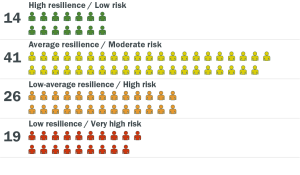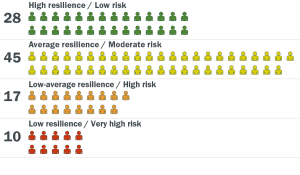Psychosocial safety: how Mindarma supports compliance and reduces risk
All Australian organisations are now required to identify and do “everything reasonably practical” to deal with psychosocial risks. This requirement is enshrined in Federal legislation and supported by Codes of Practice, which are now in place in most states and territories.
The new international standards (ISO 45003) and the recently updated WorkSafe Australia health and safety code list common psychosocial hazards as: unachievable job demands, low job control, lack of role clarity, inadequate reward and recognition, conflict and poor workplace relationships and interactions, poor support, poor change management, poor organisational justice, traumatic events, remote or isolated work, violence and aggression, bullying, harassment, and poor physical environment.
Preventing psychological injury
Of the factors that impact the likelihood of psychological injury, two of the key ones are:
- The risks workers are exposed to.
- The workers’ levels of psychological resilience.
Risk reduction through job design
Designing jobs to eliminate or manage psychosocial risks is a large and important task. There are a wide variety of measures organisations can implement to ensure psychosocial safety. Where reasonably practical, they are required to take these actions.
Unfortunately, not all psychosocial risks can be easily managed through job design. To best protect workers from psychological injury, job design measures should not be relied upon alone.
Challenges and limitations of risk reduction through job design include:
- Some risks are inherent to a role and cannot be eliminated through job design e.g. a firefighter will be exposed to traumatic events as part of their regular duties.
- It may not always be possible to deliver measures aimed at reducing risks e.g. while your organisation may seek to recruit additional workers to reduce job demands, this may be difficult to achieve where there is a tight labour market, specialised workforce or remote location.
- Change takes time. Until job design measures are fully implemented, employees may still experience risks.
- Different roles have different risks. To ensure compliance across large organisations, consideration must be paid to the psychosocial risks present within each role e.g. pilots may encounter different risks than baggage handlers or booking agents.
- Job design can only mitigate those risks experienced at work. Psychological injuries are complex and can often be impacted by events experienced outside of work.
Risk reduction through training
Just as manual handling training is used to prevent back injuries, resilience training can be used to prevent psychological injuries. Mindarma is an evidence-based program, proven to enhance adaptive psychological resilience. The program teaches a range of evidence-based psychological skills and strategies that enable workers to respond in ways that will support their own safety when encountering psychosocial risks.
Enhance resilience to lower risk
Greater resilience is associated with increased levels of wellbeing and lower levels of stress, burnout, anxiety and depression. Among high-risk occupations (i.e., high-stress roles such as first responders and frontline health workers) greater levels of resilience have been associated with lower symptoms of trauma and depression.
Initially evaluated as part of a successful randomised controlled trial, Mindarma has since been implemented across a wide variety of organisations and used to support workers in some of the world’s most challenging roles. An analysis of pre-post data for 999 Mindarma learners demonstrates how the program enhances adaptive psychological resilience and reduces risk.
Pre-training risk profile (per 100 workers)

Post-training risk profile (per 100 workers)

Benefits of Mindarma resilience training
When developing your psychosocial risk management plan, resilience training is not the whole solution. It is however a very valuable and practical place to start.
Key benefits of implementing Mindarma’s evidence-based resilience training include:
- Mindarma can be quickly and easily implemented, providing immediate protection while other psychosocial risk mitigation strategies are put in place.
- Mindarma can protect workers where risks are inherent to the job and unable to be mitigated through job design.
- Mindarma equips learners will skills, including emotional regulation and stress management, that can support them both at work and in their daily lives. 95% of Mindarma learners surveyed said they gained skills they could us in their daily lives.
- Mindarma is customisable to reflect different job roles, unique workplace stressors and psychosocial risks.
- Mindarma serves to develop a culture of care, paving the way for other psychosocial risk mitigation strategies to be more easily adopted.
- Mindarma teaches strategies that create a more cohesive work environment, with 85% of surveyed learners saying they gained skills that are beneficial in their relationships with colleagues and peers.
- Mindarma enhances early help-seeking, enabling the opportunity for risks to be addressed before injuries occur.
Like to know more? To discuss how Mindarma can help to manage risks and keep your team safe, please contact us.